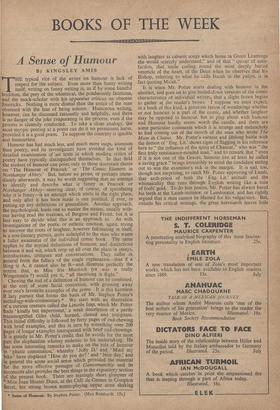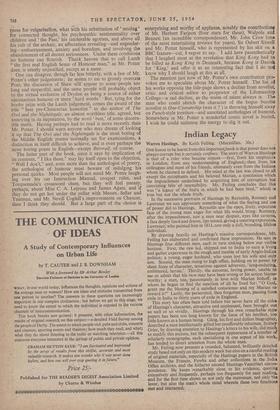BOOKS OF THE WEEK
A Sense of Humour
By KINGSLEY AMIS HE typical vice of the writer on humour is lack of respect for the subject. Even more than funny writing itself, writing on funny writing is, as if by some baneful tradition, the prey of the whimsical, the ponderously facetious, and the mock-scholar with his apparatus criticus on obscene limericks. Nothing is more dismal than the antics of the man obsessed with the fear of being solemn. Humorous writing, however, can be discussed rationally and helpfully, and there is no danger of the joke evaporating in the process, even if the process is clumsily conducted. To take a close analogy, the most myopic peering at a poem can do it no permanent harm, provided it is a good poem. To suppose the contrary is ignoble and humourless.
Humour has had much less, and much more inept, attention than poetry, and its investigators have avoided the kind of detailed examination of -set texts in which modern critics of poetry have typically distinguished themselves. In that field the student of humour can point only to those doctorate theses on ' The Humour of Peacock ' or ' The Comic Element in Northatzger Abbey.' But, before we groan, or perhaps imme- diately afterwards, it may be worth suggesting that an attempt to identify and describe what is funny in Peacock or Northanger Abbey—steering clear, of course, of speculating why it is funny—is an attempt which starts in the right place, and only after it has been made is one justified, if ever, in putting up any definitions or generalities. Another approach, the psychological, leads one to mutter the names, usually with- out having read the treatises, of Bergson and Freud; but it is less easy to decide what this is an approach to. As with investigations of the poetic or esthetic emotion, again, trying to uncover the roots of laughter, however fascinating in itself, is a non-literary pursuit, quite unhelpful to the man who wants a fuller awareness of the individual comic book. The same applies to the myriad definitions of humour, and distinctions between it and wit, which crop up all over the place in essays, introductions, critiques and conversations. They suffer in general from the fallacy of the single explanation—that if a thing is A, it cannot also be B—and illustrate perfectly the notion that, as Miss Iris Murdoch (or was it really Wittgenstein ?) would put it, " all theorising is flight." with laughter at cabaret songs which home in Green Loamings she would scarcely understand," and of that " quiver of satis- faction, that smile curling round the most deeply buried ventricle of the heart, of the Dean when he observes that his Bishop, referring to what he calls Isaiah in the pulpit, is in fact quoting Micah." room for vulgarisation, what With his substitution of ' musing' for connected thought, his psychopathic sentimentality over children and ` the Past,' his intolerable egotism, and above all his cult of the archaic, an affectation revealing—and engender- ing—embarrassment, anxiety and boredom, and involving the abandonment of all decent seriousness. Under these conditions no humour can flourish. Thank heaven that to call Lamb " the first real English Sense of Humour man," as Mr. Potter does, is utterly unjustified, except as a sneer.
One can disagree, though far less bitterly, with a few of Mr. Potter's other judgements: he seems to me to grossly overrate Pont, the discussion of Shaw will appear to some people too long and respectful, and the same people will probably object to the virtual exclusion of Dryden as being a source of either unconscious humour or mere ` hard words.' But, tying for the booby prize with the Lamb judgement, comes the award of the title ` best pre-Chaucerian humorist " to the author of The Owl and the Nightingale, an almost worthless title, agreed, but annoying in its imputation, by the word ` best,' of some discern- ible merit. Having perhaps had to read it more recently than Mr. Potter, I should warn anyone who may dream of looking it up that The Owl and the Nightingale is the most boring of the Middle English poems normally set for examinations, a distinction in, tself difficult to achieve, and is even perhaps the most boring poem in English—except Beowulf, of course.
The latter part of the book, since it says by implication of its contents, " I like these," may lay itself open to the objection, " Well I don't," and, even more than the anthologist of poetry, the anthologist of humour must beware of indulging his personal quirks. Most people will not mind Mr. Potter laugh- ing over his car Instruction Manual, croquet rules, and Torquemada's crossword clues, but they will feel uneasy, perhaps, about Miss C. A. Lejeune and James Agate, and if they do not get hot under the collar with Messrs. Sellar and Yeatman, and Mr. Nevill Coghill's improvements on Chaucer, then I think they should. But a large part of the choice is enterprising and worthy of applause, notably the contribution! of Mr. Herbert Farjeon (four stars for these), Walpole and Bennett (an incredible correspondence), Mr. John Crow (ono of the most entertaining reviews for years), Sir Osbert Sitwell and Mr. Potter himself, who is represented by his skit on a BBC feature—cut, I regret to say. I add here parenthetically that I laughed most at the revelation that King Kong had to be billed as Kong King in Denmark, because Kong is Danish for ' King,' and offer it as an interesting fact that I do nog know why I should laugh at this at all.
The mention just now of Mr. Potter's own contribution pro. yokes me to speculate about Mr. Potter himself. The list of his works opposite the title-page shows a decline from novelist. critic and critical editor to proprietor of the Lifemanship College—a sad decline, as the waste of talent always is. The man who could sketch the character of the bogus bucolic novelist in One-Uptnanship (was it ? ) is throwing himself away on Punch-style treatises—and annotated anthologies of humour. Somewhere in Mr. Potter a wonderful comic novel is buried. I wish he could summon the energy to dig it out.



































 Previous page
Previous page